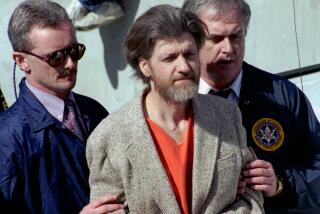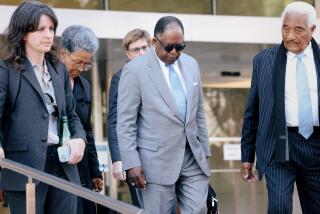Selection of Unabomb Trial Jurors Begins
- Share via
SACRAMENTO — Looking more like a college professor than a shaggy hermit, Unabomber suspect uheodore Kaczynski on Wednesday watched his attorneys search for jurors who would be willing to spare his life if he is convicted at his murder-by-bombing trial.
As jury selection began, Kaczynski was outwardly engaged, affably conferring with his attorneys, jotting down notes, acknowledging a woman on his defense team sitting in the front row and gazing at prospective panelists who will decide his fate.
Kaczynski’s appearance--neatly groomed beard, gray plaid coat, light gray shirt, charcoal pants--stood in sharp contrast to the disheveled mountain man with torn clothes who was arrested 19 months ago at his backwoods Montana cabin.
Addressing a packed, high-security courtroom, U.S. District Judge Garland E. Burrell Jr. pointedly reminded prospective jurors that Kaczynski is innocent until proven guilty, and that his goal is to “obtain a fair and impartial jury.”
Kaczynski, 55, a former UC Berkeley mathematics teacher, is on trial in connection with the separate bombing deaths of Hugh Scrutton and Gilbert Murray in Sacramento and the maiming of two academicians in New Haven, Conn., and Tiburon, Calif. He has pleaded not guilty.
Prosecutors contend that Kaczynski is the elusive Unabomber, responsible for an 18-year bombing spree that killed three people and injured 23.
Authorities say Kaczynski was an anti-technology terrorist. Ironically, the federal courtroom in which the case will be tried relies on computer technology. The prosecution has an elaborate computer setup at its table; another computer is close to the court clerk. The defense table also is equipped with two recessed monitors.
*
Court administrators have 600 potential jurors from 23 mostly rural counties poised to come to the John E. Moss Federal Building for questioning. The names of the jurors will not be divulged, to protect their privacy.
Inside the courtroom, attorneys explored a variety of issues with prospective jurors, from their health and heroes to their spirituality and stands on capital punishment.
Moments of levity mixed with the hours of sharp-edged questioning of jurors drawn from an area stretching from Stockton to the Oregon border.
One of the first jurors said that among the three people he admires most was quarterback Jeff George of the hapless Oakland Raiders. “Everybody has heroes,” he said.
At one point, Burrell, exasperated that some prospective jurors had ignored his instructions to avoid news accounts about the trial, declared, “Maybe I should create a newspaper for the jury to read.” He told one potential juror he didn’t want her to listen to the radio, even “elevator music.”
Much of the probing focused on weighty issues such as the prospective panelists’ views on the death penalty, in addition to queries about pretrial publicity.
Have the jurors heard about the string of bombings that make up the Unabomber case? Have they formed an opinion of the former mathematics professor turned recluse? Could they sentence Kaczynski to be executed? Can they interrupt their routines to spend the next four months weighing evidence?
“The goal of the defense in particular will be to find jurors who aren’t familiar with the case,” said Diane Amann, a former assistant federal public defender and now an acting professor of law at UC Davis.
“They are probably going to be looking for jurors who seem honest and straightforward about their exposure to the case,” she said in an interview.
If Wednesday’s proceedings were any indication, it will be a difficult challenge finding jurors unaffected by publicity in Northern California, where the case has been heavily reported in newspapers and on radio and television broadcasts.
One woman, for example, told Burrell that after she was summoned for jury duty, she had heard news accounts of the case on the radio. “I just turn it on for the noise,” the woman said.
Burrell admonished her, saying “I don’t expect my jurors to be listening to news about this case.”
The same woman voiced uncertainty about the death penalty.
“I don’t feel I can sit here and say whether he [Kaczynski] should live or die,” she told Burrell before she was excused.
The questioning provided a glimpse of the upcoming case in which prosecutors have produced a stack of evidence that they believe implicates Kaczynski in the bombings.
Kaczynski’s attorneys appeared to be looking for jurors who, even if they decide Kaczynski is guilty, could nonetheless sentence him to life in prison rather than send him to his death.
*
Part of their strategy may also revolve around questions about Kaczynski’s mental condition. In papers filed late Wednesday, a defense expert indicated that Kaczynski is afraid of psychiatrists and believes that technology is out to get him.
“A central organizing feature of Mr. Kaczynski’s delusional system is a belief that every aspect of his existence is controlled by [an] omnipotent organization against which he is powerless,” said Dr. David Foster in court documents.
Of the initial 12 people quizzed Wednesday, five were excused, including a 64-year-old diabetic who said he believed Kaczynski was guilty. The man was let go for hardship reasons.
Kaczynski sat next to his attorneys and an Atlanta-based jury consultant; a few feet away sat Connie Murray, the widow of Unabomber victim Gilbert Murray.
“She had to be here and see. She wanted to be here the first day,” said Mark O’Sullivan, an FBI chaplain serving as a spokesman for the Murray family.
“This is a very emotional time for them,” he said. But, he added, “this woman doesn’t have a hateful bone in her body.”
Jury selection will continue today.
More to Read
Sign up for Essential California
The most important California stories and recommendations in your inbox every morning.
You may occasionally receive promotional content from the Los Angeles Times.













